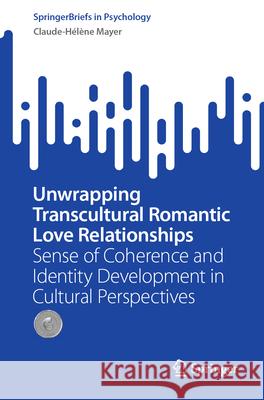Unwrapping Transcultural Romantic Love Relationships: Sense of Coherence and Identity Development in Cultural Perspectives » książka
Unwrapping Transcultural Romantic Love Relationships: Sense of Coherence and Identity Development in Cultural Perspectives
ISBN-13: 9783031295324 / Angielski
Unwrapping Transcultural Romantic Love Relationships: Sense of Coherence and Identity Development in Cultural Perspectives
ISBN-13: 9783031295324 / Angielski
(netto: 172,09 VAT: 5%)
Najniższa cena z 30 dni: 173,46
ok. 22 dni roboczych
Bez gwarancji dostawy przed świętami
Darmowa dostawa!
This research study explores the interlinkages of three major themes, namely transcultural romantic love relationships (TRLRs), sense of coherence (SOC), and identity development (ID) in individuals who are presently involved in romantic love relationships (RLR) with partners from different cultural or ethnic backgrounds. The study uses a qualitative research design within the hermeneutical interpretative research paradigm, aiming to understand the interlinkages of TRLR, SOC, and ID. Based on purposive and snowball sampling techniques, the study includes 22 participants (12 female and 10 male) between 23 and 68 years of age, from 14 different (self-defined) cultural backgrounds. At the time of the interview, participants had been in TRLRs for at least 6 months to a maximum of 26 years. Data were collected through semi-structured interviews and analysed through content analysis. Qualitative quality criteria and ethical considerations were applied. The findings show that TRLRs are firmly based on relationship qualities, strong feelings, common actions, spirituality, and future orientation. Further, the findings present clear interlinkages between TRLR and SOC, contributing positively to meaningfulness, manageability, and comprehensibility. Finally, TRLRs support SOC on intrapersonal, cultural, and interpersonal levels. In addition, they influence the development of identity awareness, actions, feelings, and sexual SOC. Conclusions, limitations, and recommendations for theory and practice are provided.
This research study explores the interlinkages of three major themes, namely transcultural romantic love relationships (TRLRs), sense of coherence (SOC), and identity development (ID) in individuals who are presently involved in romantic love relationships (RLR) with partners from different cultural or ethnic backgrounds. The study uses a qualitative research design within the hermeneutical interpretative research paradigm, aiming to understand the interlinkages of TRLR, SOC, and ID. Based on purposive and snowball sampling techniques, the study includes 22 participants (12 female and 10 male) between 23 and 68 years of age, from 14 different (self-defined) cultural backgrounds. At the time of the interview, participants had been in TRLRs for at least 6 months to a maximum of 26 years. Data were collected through semi-structured interviews and analysed through content analysis. Qualitative quality criteria and ethical considerations were applied. The findings show that TRLRs are firmly based on relationship qualities, strong feelings, common actions, spirituality, and future orientation. Further, the findings present clear interlinkages between TRLR and SOC, contributing positively to meaningfulness, manageability, and comprehensibility. Finally, TRLRs support SOC on intrapersonal, cultural, and interpersonal levels. In addition, they influence the development of identity awareness, actions, feelings, and sexual SOC. Conclusions, limitations, and recommendations for theory and practice are provided.











